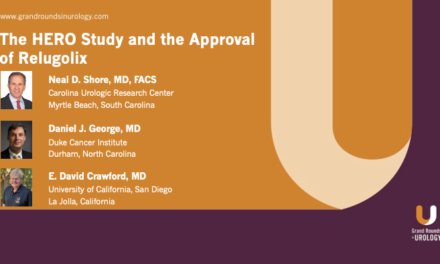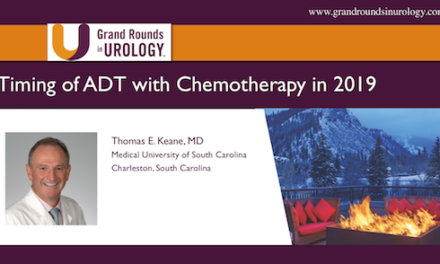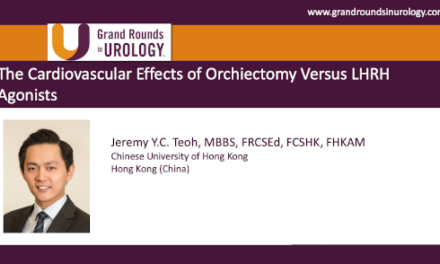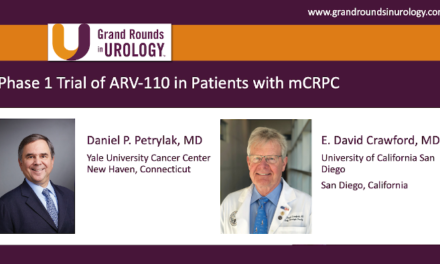Neil D. Shore, MD, FACS; Daniel J. George, MD; and E. David Crawford, MD, presented “The HERO Study and the Approval of Relugolix” for the Grand Rounds in Urology audience in December 2020.
How to cite: Shore, Neal D. George, Daniel J. Crawford, E. David “The HERO Study and the Approval of Relugolix” December 2020. Accessed Apr 2025. https://grandroundsinurology.com/the-hero-study-and-the-approval-of-relugolix/
Summary:
E. David Crawford, MD, Professor of Urology at UC San Diego and Editor-in-Chief of Grand Rounds in Urology, interviews Neal D. Shore, MD, FACS, Medical Director for the Carolina Urologic Research Center, and Daniel J. George, MD, Director of Genitourinary Oncology at Duke Cancer Center, about relugolix, which became the first oral testosterone-suppressive drug approved by the FDA on Friday, December 18, 2020. Drs. Shore and George discuss the results of the international, randomized HERO study, which looked at patients with advanced prostate cancer and found that relugolix, a daily oral GNRH antagonist, had a 97% sustained T-suppression rate as compared to leuprolide’s 88% sustained T-suppression rate. In addition to this high degree of efficacy, they emphasize that patients taken off relugolix saw their testosterone return to higher levels within 90 days than patients taken off leuprolide, which is important for patient quality-of-life. Drs. Shore and George also underline that patients in the relugolix arm of the HERO study saw a more than 50% reduction in risk of major adverse cardiovascular events compared with patients in the leuprolide arm, which suggests that relugolix might be a safer option for prostate cancer patients at high cardiovascular risk. Other topics covered include the benefits of antagonists versus agonists and the possible risks of patient non-compliance.
You can explore more about ADT on GRU at our Next Generation Learning Center.
About the Authors

Neal D. Shore, MD, FACS
Neal D. Shore, MD, FACS, is the Medical Director for the Carolina Urologic Research Center. He practices with Atlantic Urology Clinics in Myrtle Beach, South Carolina. Dr. Shore has conducted more than 350 clinical trials, focusing mainly on genitourinary oncology, and serves on the executive boards of the Society of Urologic Oncology and the Bladder Cancer Advocacy Network. He is Past President of the Large Urology Group Practice Association. He is a founder for both CUSP Clinical Trials Consortium and DASHKO, a national urology practice data registry. He serves as the National Urology Research Director for 21st Century Oncology. He has served on the AUA Male Health Committee and the AUA Data Committee, the SITC Task Force for Prostate Cancer, the Bladder Cancer Advocacy Think Tank, and the Editorial Boards of Review in Urology, Urology Times, Chemotherapy Advisor, OncLive, PLOS ONE, Urology Practice, and World Journal of Urology. He serves as Editor of Everyday Urology-Oncology. Dr. Shore has written more than 200 peer-reviewed publications and numerous book chapters. He performs peer review for Lancet Oncology, New England Journal of Medicine, European Urology, the Journal of Urology, Urology, BJUI, PCPD, and numerous other high-impact scientific journals. A graduate of Duke University and Duke University Medical School, Dr. Shore completed a 6-month clinical research fellowship in Pretoria, South Africa, and then completed his General Surgery/Urology training at New York Hospital Cornell Medical Center and at Memorial Sloan-Kettering Cancer Center in New York City. He is a Fellow of the American College of Surgeons.
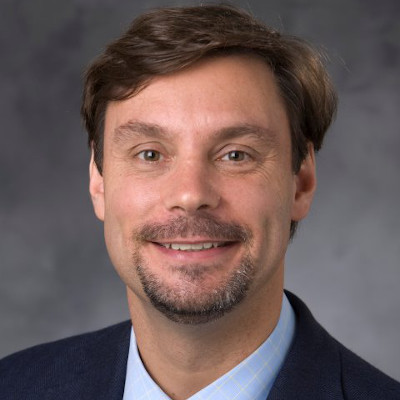
Dr. Daniel J. George is a Professor of Medicine and Surgery, Divisions of Medical Oncology and Urology in the Duke University School of Medicine. He also has appointments in the Duke Clinical Research Institute and the Duke Cancer Institute where he is Co-leader for the DCI Center for Prostate and Urologic Cancers. He an internationally recognized clinical researcher and thought leader in GU malignancies, with over 150 peer-reviewed publications. His areas of research include new drug development and biomarkers of GU cancers with an emphasis on health disparities. Dr. George is principal investigator of the Duke site for the Department of Defense (DOD) Prostate Cancer Clinical Trials Consortium since 2006, specializing in Phase I and II studies in prostate cancer. He is also the PI of the MaRCC registry in advanced renal cell carcinoma and Co-PI of the PCF 5000, an international, multi-sponsor supported registry in advanced prostate cancer. Nationally, Dr. George has served on the ASCO scientific committee and the Conquer Cancer Foundation grants review committee, and is chair for 2019-20. He alsoserves on two grant committees for AACR. He is the scientific leader for kidney cancer in the Alliance Cooperative Group since 2011 and serves on the Alliance GU scientific committee, NCI GU Steering Committee and the NCI Renal Task Force. He serves as a senior editor for Clinical Cancer Research and Co-editor in Chief of Clinical Advances in Hematology and Oncology.
ABOUT THE AUTHOR
Dr. Daniel J. George is a Professor of Medicine and Surgery, Divisions of Medical Oncology and Urology in the Duke University School of Medicine. He also has appointments in the Duke Clinical Research Institute and the Duke Cancer Institute where he is Co-leader for the DCI Center for Prostate and Urologic Cancers. He an internationally recognized clinical researcher and thought leader in GU malignancies, with over 150 peer-reviewed publications. His areas of research include new drug development and biomarkers of GU cancers with an emphasis on health disparities. Dr. George is principal investigator of the Duke site for the Department of Defense (DOD) Prostate Cancer Clinical Trials Consortium since 2006, specializing in Phase I and II studies in prostate cancer. He is also the PI of the MaRCC registry in advanced renal cell carcinoma and Co-PI of the PCF 5000, an international, multi-sponsor supported registry in advanced prostate cancer. Nationally, Dr. George has served on the ASCO scientific committee and the Conquer Cancer Foundation grants review committee, and is chair for 2019-20. He alsoserves on two grant committees for AACR. He is the scientific leader for kidney cancer in the Alliance Cooperative Group since 2011 and serves on the Alliance GU scientific committee, NCI GU Steering Committee and the NCI Renal Task Force. He serves as a senior editor for Clinical Cancer Research and Co-editor in Chief of Clinical Advances in Hematology and Oncology.

